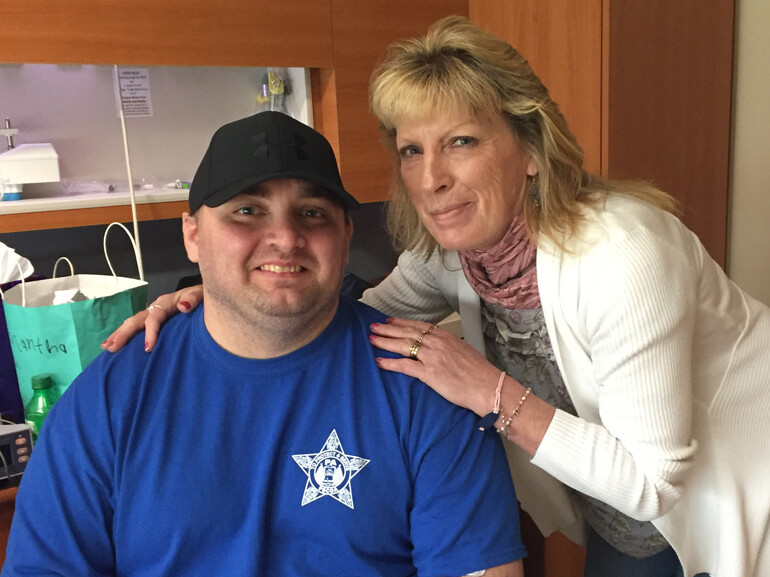Kevin's story

Perseverance pays off
Kevin Hoch had the worst headache of his life. The 37–year-old sergeant with the state corrections system described his pain as, “not even a scale of 1 to 10, it was more like a 19.”The increasing intensity of his headaches had a growing impact on his life. Sometimes the migraines would render him unable to stand while shaving or at work. The crushing pain often left the father of two bedridden and in tears. The migraines peeked one day one day while Kevin was driving. He lost consciousness and his car shot across two lanes, striking a parked camper.
“I hardly knew what was happening, he said. I couldn’t think. They were asking me about calling a garage to pick up my car and I couldn’t answer. I just saw my car in the middle of road leaking fluids. Then I was in the ambulance on my way to the hospital.”
Two CT scans didn’t provide much information. However, an MRI revealed a blood clot causing swelling in his brain. Kevin had a stroke.
The stroke resulted in a number of issues. He couldn’t speak and was placed on a ventilator to assist with his breathing. He had a left-sided gaze preference. He was lethargic and had impairments in his endurance, strength, stability, mobility, daily living skills, balance, gait and cognition.
After being stabilized, Kevin was weaned off breathing support and spent nine days at Penn State Health Milton S. Hershey Medical Center. He was then transferred to Penn State Health Rehabilitation Hospital, which specializes in helping stroke patients recover.
Reflecting on his rehabilitation stay, Kevin notes, “I never believed I would be out of rehab in a week.”
Physical, occupational and speech therapists created a plan to help Kevin rebuild his strength, stamina and independence.
Physical therapists worked to get his legs moving in sync again, then transitioned to helping him walk over uneven surfaces and stairs.
Speech therapists, using word repetition, games and puzzles, helped his mind connect to thoughts, improve its recall ability and engage in critical thinking.
Occupational therapists helped him regain the ability to perform self-care tasks, such as bathing and dressing, by himself.
One of the major defining moments for Kevin was arriving at the rehabilitation hospital and being escorted in the bathroom by his therapist. He notes, “It’s hard to be 37 years old and have a 35-year-old, young guy in the bathroom with me watching everything I do. I get it, and the therapist was 100 percent personable but that there I can’t do. My first goal was get my bathroom card changed from red to green so I could go in the bathroom alone.”
After one week, Kevin’s perseverance paid off. He was able to leave the hospital and go to his mother’s home in Lebanon until he was able to safely return to his State College home independently. He is looking forward to more time with his two daughters.
On discharge day Kevin set a new goal, “My goal now is to get out and ‘get normal,’ to get my mind thinking the way it used to. I still have work to do.” While it will take months for his blood clot to dissolve, Kevin’s mother is supporting him by taking to him to continued outpatient therapy and medical appointments.
Just six months after his stroke, Kevin was able to start driving again. He also recently got promoted from sergeant to lieutenant and stated he feels very fortunate to be so far along in his recovery.
Kevin relied on numerous inspirational quotes to motivate him during his rehabilitation stay. He wants to share two of his own inspirational quotes with others: “Commit to come back even stronger when you meet a challenge like this. The minute you do not feel not yourself, go get help immediately.”